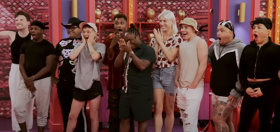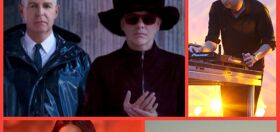
It’s never easy writing about depression: I should know, I’m writing this piece. The last time I suffered a bout it was a perfect storm of older man issues hitting at once: finances, aging, weight, looks, being single, the health of my mother.
And then the world…
I couldn’t read the paper, I stopped eating (then started binge-eating), had no interest in the gym or pastimes likes hitting the movies or hanging out with friends. Sex lost its luster. My bed became my best friend, that place where I could still sink into a pillow and dream, where I didn’t need to dress or shower or fake interest or a smile. I looked forward to nightfall.
Many of the Daddy Issues I’ve covered in the past have focused on more surface-related issues, like how to enjoy sex after 50 and why it’s wrong to insult a Twink. But, as my older gentlemen friends know, there are darker matters involved with aging, and they can’t be resolved in Cosmo-quiz-like fashion.
How about we take this to the next level?
Our newsletter is like a refreshing cocktail (or mocktail) of LGBTQ+ entertainment and pop culture, served up with a side of eye-candy.
Depression hits approximately 10 million people a year, and it’s estimated that 15 percent of the adult population will have an episode of depression during their lifetime. Gay men are three times more likely than the general population to suffer from depression. As such, they are also more prone to suicide.
Knowing the statistics about depression is helpful, acknowledging the illness, imperative, but what to do about it? That’s the next step. Seeking medical attention might be necessary, but you also need to fight from the inside—with a little help from your friends.
“We know why depression hits older men,” says Keith Bernardo, a psychologist in Virginia. “The loss of any sort of personal agency. People’s careers end, they retire, they lose a husband or a spouse; their sense of purpose goes away. There is often hopelessness that sets in. That’s a keyword for depression.”
Truth is, all the issues I was dealing with are common for men in my age group. And there are more to come. That’s why, holistically speaking, it’s vital to open up about depression. As with all psychological illnesses, there tends to be a need to hide depression, to push it aside, to pretend we’re always as peppy as our Facebook page would suggest. In the long run, denial only makes depression worse.
Says Bernardo: “One of my pet peeves is that even the smartest among us see depression as being weak, or ‘it’s just thoughts,’ or ‘just suck it up,’ or ‘it will pass.’ That’s just not true. It’s not simply ‘pull your thoughts together.’ They like to say they’re just not Oprah-ing their way out of it.”
Once you open up to people about your struggle, you’ll more than likely find they’ve experienced similar problems and are happy to share stories, offer advice, and lend an emotional hand. It’s therapeutic for both parties.
“When patients are at risk, I look for subtle changes in cognition,” says Bernardo. “Lethargy, a slight disengagement, loss of interest. Once depression takes root it’s a really unpleasant circumstance.”
Whereas I used to keep my depression hidden behind a smile and, too often, self-medication, I now make sure it’s out in the open, shared, another part of me that I need to embrace.
“Make sure you have social support,” adds Bernardo. “Social isolation isn’t just a symptom of depression; it’s a cause.”




















MatthewHall
It is so important for gay men to talk about this. I’ve known 4 gay men in their late 40s and 50s who’ve killed themselves in the last year. Each left messages saying that they couldn’t see a way to grow as gay men. They saw isolation and dysfunction in other gay men and saw nowhere to turn for support. One was a good friend and it felt like a kick in the stomach to read such comments from him. Each described a future of loneliness and saw no role for themselves in the world. Their fading sexual energies and fading sexual interest from other gay men left them without any other way to validate their emotions and experiences. I will never get over not letting them men know how I felt about them and about my own struggles in adjusting as my sexuality and sexual interest in me fades. I too regret having spent so much of my life alone and fear that I won’t be able to handle growing old alone. I’ve made my peace with my life, but it wasn’t easy. Gay men have to ‘come out’ about their struggles. It’s not a sign of your weakness. It’s a sign that you are human. Gay men would be inhuman if they DIDN’T have emotional struggles in a society where they are attacked constantly.
Heywood Jablowme
That’s terrible, but there’s a tinge of irony in that — did any of those four men know each other? They all were so worried about “a future of loneliness” etc. and yet there were so many of them! It’s like they could have formed a loneliness club if only they’d thought to do so. (Basing this just on their own STATED reasons for committing suicide. There may have been other things going on that they left out.)
In my age group (60-ish) there are LOTS of guys who are missing, who just didn’t live this long because of the ’80s-’90s plague, so there is loneliness but I always remind myself there are still lots of guys my age who ARE still around. I know I’m more impervious to loneliness than most (I grew up very solitary) but I make myself reach out, and make a point of getting together with a friend once a week. Sometimes one I find a bit “difficult” so I’ll try to focus on an appealing quality or interest.
MatthewHall
No. They’re only connection was through me. Two of them met each other at my place last year, but they all lived at some distance from each other.
Josh447
It also doesn’t help anyone with the religious right beating on your head night and day, for over twenty years. That goes for any age.
Trekbike
That’s the absolute truth. They’ll never stop harassing us. NEVER!!
Cacti
The sad truth is that if you didnt find a lasting partner while younger, its going to be very hard to find one once you reach a certain age. And almost impossible if you dont look good, have money, and education.
Although to deal with depression you dont need any of this actually, you just need antidepressive medicine, like prozac. You might become chemically incapable of suffering, but of course that wont resolve the loneliness issue. Its just you wont care that much anymore.
MatthewHall
How do you know any of this?
Donston
This is why developing a solid ego that isn’t based around persistent and often shallow validation from others is so important and why actually having romantic passion, romantic fulfillment and emotional contentment towards someone of your gender is as key to being “gay” as the dimensions of your sexual passions and sexual fulfillment, if not more so.
A lot of people endure midlife crisises, but many “queers” also have to contend with internalized homophobia, still feeling like an “outsider”, the pressures and influences of conventional heteronormalcy, ebb and flow battles with depression, anxiety, past sexual abuse, addiction, self-destructive instincts and religious paranoia/guilt.
As far as finding a partner once you’re older, I got married at 27 and just turned 30, while most of my older friends are in relationships. But I don’t think it’s as difficult to a partner beyond the age of 40 as it probably was just a few years ago. That is unless you’re looking for exclusively young, pretty boys or you’re a hetero worshiper or your expectations are ridiculous. Just being unabashedly out and continuing to put yourself out there and being confident should assist a great deal.
Having honest and continuous conversations about these things seem to be the only way of helping people to avoid it.
Heywood Jablowme
Good points, and it doesn’t help that so many of these loneliness discussions simply conflate “not having a partner” with loneliness. Those are two very different things.
It’s possible to find non-sexual friends your own age at ANY age. (I’d even say it’s easy, and I’m the most anti-social person I know, lol.) Partnering is different, but I agree with you that it’s probably getting less difficult.
lovelandbiguy
As I read your comment I thought that your sentiment was kind, and the exact reason why so many of us (I’m 46) older men are depressed. You’re 30, and married at 27; in 20 years life may have dumped you completely on your head. You may be single for any number of reasons and discover that unless you’re 27, have money, visible abs, and viagra that your sex life will pretty much be 25% of what it is for you at 27-30. And at 30, you just don’t get it.
I hear your intended kindness, but at the same time you’re part of the “get over it, it’s not that bad” group. It really is that bad. Really. So much of gay culture is based upon youth, body image, and virility, that when those things fade, and Mary, they fade, you’re no longer culturally relevant or desirable.
The fix is very individual. On an individual level every person has to find meaning in their lives, and it’s difficult. I’m kind of curious, Donston, if you’ve ever actively constructed a friendship with an older gay man simply because you wanted to? Because if you’re ignoring us, you’ll be ignored when you age, too.
I once told a friend of mine when he turned 30 that he had one foot in the gay casket, at 40 you’re really dead and by 50 you’re dead and forgotten. It’s sad, but true. I feel truly blessed to have children in my life, because I have zero gay friends, they are all dead from the plague or chasing their youth in Florida/New York/LA.
I do really wonder what will happen in 20 years when your generation gets old and wrinkled, finally discovering what it means to age. And when I’m 68, I can tell you, “just keep putting yourself out there, it’s really not that hard” (and I’ll laugh at your shock).
Vince
@lovelandbiguy. Excellent response. Donston is saying happiness comes from finding a good partner. Why everyone I know is partnered. Of coarse all the perspective of someone barely out of their twenties and their own made up reality. Most gay men past a certain age are single though. The fact is that it’s allot easier to find someone when you’re younger. Lets face it. We as gay men connect mostly through sex. You start losing that or the connections you once had that centered around it and it’s wayyyyy more difficult. Personality is nice but…
Heywood Jablowme
@lovelandbiguy and Vince: Donston can speak for himself (& probably will).
But I’m over 60 and I totally disagree with you guys. Why are you blaming “gay culture” for all that stuff?
A 46 year old has plenty of guys in his own age group to make friends with, or even to date (gasp). If your virility isn’t what it used to be, how is that the fault of younger guys? (Because they’re supposedly running this mysterious “gay culture”?) Why is the responsibility of young guys to make friends with “old” guys who are 46? It’s nice if they do (I did when I was young), but if they don’t, so what? Maybe they’re afraid you’d hit on them sexually and they don’t know how to say no politely. Maybe they’re just intimidated by know-it-all older guys who want to give them historical lectures.
If you’ve ever been on a serious dating site – or even Scruff, lol – did you take serious interest in any of the guys your own age or older? Or did you have unrealistic expectations? (Rhetorical questions b/c I know the answers already.)
For a 46 year old, lovelandbiguy, you’re sure doing a lot of whining, and blaming others for problems that, while real, are to some extent under YOUR control and not under their control at all.
Donston
No, I don’t think happiness is about finding a partner. I don’t see how anyone can decipher that from my post. That’s a very defensive reaction that ignores the post as a whole. I started out by saying not depending on anyone for validation (including a romantic partner or an identity or sociological status) is important. Building up your own ego independently is key. I don’t lean on my husband or even my kids to complete me or money or people telling me I’m sexy or likes on a tweet or app profile responses. I had to go on my own journey. And I may have more journies in my future. I am prepared for them. I’m also not sitting here pretending as if I haven’t already been through a lot of sh*t, pretending that I have no fear of aging or pretending like my life now and my mental health now are so perfect. I talked about partnership and finding a partner because the artcle and “research” claimed it’s a big reason why many older gay men contend with depression: feeling hopeless as far as not finding one. I actually moved away from that simplistic explanation and tapped into all the other reasons why gay men may contend with depression, especially as they age.
I’m also tired of people blaming “culture” on everything, including their social and mental ailments. Culturally, yes, there are some adjustments that need to be made. There are some unfortunate trends and patterns that hasn’t seemed to die down through the generations. And there are some uncomfortable, nuanced conversations that many are afraid to indulge to protect their status, their agenda, their sense of self, their ego. Perhaps more than any group “queer” people contend with the most inner struggles and the most cultural and sociological pressures. The combination of those things can be overwhelming. But culture is made out of individual people. And if you want to help change the culture in general, but in particular your individual culture, then you have the power to do so. Everyone has power over their lives. “Culture” doesn’t run anyone. It’s certainly never controlled my decision making, my sense of self or my morale.
MatthewHall
So many of these comments show why many gay men consider radical actions like suicide.
Esscourt
So easy to comment when you’re in a relationship!
RomanHans
I’m an older gay man, and a frw years ago I recognized that not even New York provided the community I wanted. Gays are everywhere, but they’re also half my age and have different priorities (no, I don’t want to talk about your Grindr hookup).
So, I moved to Berlin. Honestly, it’s like the Wizard of Oz turning from black-and-white to color — and that’s leaving America’s sad political collapse aside.
To people feeling isolated: it’s not you. I felt like that IN NEW YORK CITY. Your community exists somewhere. For the sake of your happiness, find it.
MatthewHall
Exactly. I’ve found gay men in Columbus, Austin, and Denver much more friendly and genuine than guys in the gay meccas.
Greg
Actually, it was sepia tone to color in the Wizard of Oz.
lovelandbiguy
Read your own article
https://www.queerty.com/gay-guys-45-way-likely-single-survey-finds-20180730
Kangol
One issue this article doesn’t really deal with is how for gay and bi men over 45 (so born in 1973 or thereabouts), those who are alive, especially the ones over 50, may have witnessed a sizable portion of men of their generation dying from AIDS. That horrific tragedy, whose aftermath is still with is–the disease is still with us–caused immeasurable psychic and physical trauma for several generations of gay and bi men, especially ones who are anywhere from 50-51 (so in their teens when AIDS struck) to 80 or so (so in their early 40s). That is several generations of gay men who live with survival guilt and the terrible witnessing, on top of everything else (ongoing internalized and external homophobia, the ongoing battle for equal rights under the law, general life issues like relationships, family, jobs, etc.). So it makes sense that not only loneliness but depression might strike this group of men, and the question remains, are there resources for older gay men now, and how can we improve them today and for future generations. We aren’t going anywhere, no matter how badly homophobes try to erase us.
Aires the Ram
Generally speaking, when you’re in your 20’s and early 30’s, you make friends that last a life-time. I did when I was that age, but along came the plague years, and all but 2 of them died. Another thing, once you turn 50-ish and over, you are no longer looked upon as a sexual being, especially in the so-called “gay community”. You might be a guy who was ‘hot’ when in his 30’s and early 40’s, but let me tell ya, that ‘hotness’ fades, and new hotter younger men are coming up right behind you. It’s a hard adjustment for many gay men. If you’re 30 years old now, hotter than fire, getting all sorts of sexual attention, that’s great, it’s a great feeling, but you MUST invest in something other than your looks, so that you don’t get depressed when they all start looking THROUGH you and PAST you, as WILL happen.
nitejonboy
I’m only 40 and I’ve suffered from depression for years, of course I’m also bipolar so I guess that makes sense, but I still make it a habit to put it out in the open and own up to it….I wish I didn’t sleep all day and stay up all night, I wish I knew how to ” snap out of it “, but I’m not gonna kill myself, that would just put my burdens on my family. But it’s hard….it’s been a year since my mama died and some days I’d give anything to be at her side again. I don’t feel like I have much left to live for. I guess I need to find something.
Greg
I thought 50 is the new 30? That’s what I keep telling myself.
Times2
I’m 69, too poor to retire, and for that reason stuck in the humiliating situation of living with my ex of 21 years. I came out at 26 after a brief marriage to a woman. That was five or six years before the AIDS holocaust began. Over the next decade, my first partner and literally every queer friend I had died. (I lived in three major cities and worked in very public jobs, so I had a lot of friends.)
I never expected to live this long and, owing to a lifelong struggle with clinical depression, I never really wanted to live this long. It seems proof of the cruelty of existence that I have outlived so many people who did not want to die, who often couldn’t even believe they were dying. In the last year, three very close friends have died and another is about to (none due to HIV). Again, I keep asking myself why I’m outliving them. I’ve even outlived my younger brother.
I do not think there is anything inherent in gay identity that requires us to become depressed or age so painfully. (Talk to any older, single straight woman and you’ll hear all the same complaints about invisibility, failing health, and loneliness.) It is true, however, that when men my age took baby steps out of the closet, we were literally, officially regarded as mentally ill, criminal sinners — all because of the way we loved. You do not grow up in a world that forbids the primary existential emotional need of all humans, love, without consequence. If you have on top of that context the misfortune of a genetic predisposition, depression is debilitating to a degree most other people can’t grasp. Suicide is not about wanting to end life. It is about wanting to end pain. You want that instant when the bullet shatters the pain.
I like to think that because the context of homophobia enabled by church, state, and medicine has lost its omniscience, young gay people are not as vulnerable to the full eclipse of depression. But we all know that, outside major urban areas, that has only marginally changed. That other habitation, digital reality, unfortunately is also plagued by hate.
Depression — and I say this as a psychotherapist myself — is not curable. So-called situational depression, such as grief that follows a death, passes with time. Treatments for clinical depression’s symptoms are at best mildly effective over time. I think it’s important if your depression is of the clinical type that you not simply confess it to others, but acknowledge that it’s part of who you are and it’s not going away. In earlier times, it was called melancholia and it was not regarded as an illness but as a perspective. We can’t do that easily in our capitalist culture. But, believe it or not, melancholia can be put to good use. (Would Mr. Toussaint be writing his column were he not depressed?) There are paths we can walk that others can’t negotiate. I know that’s a cliche of the disabled, but it’s true. Dig deeper.